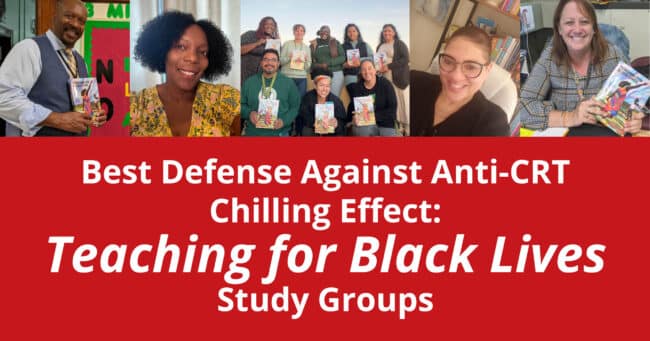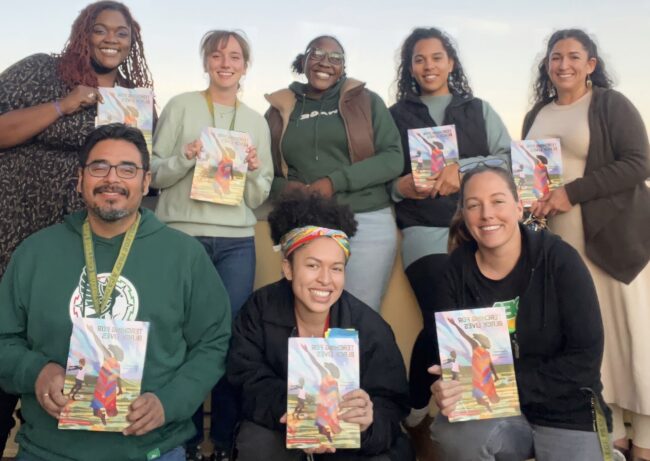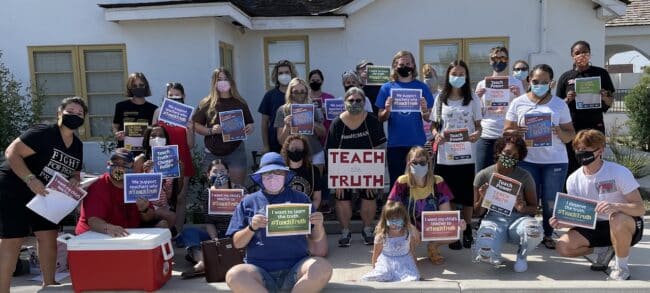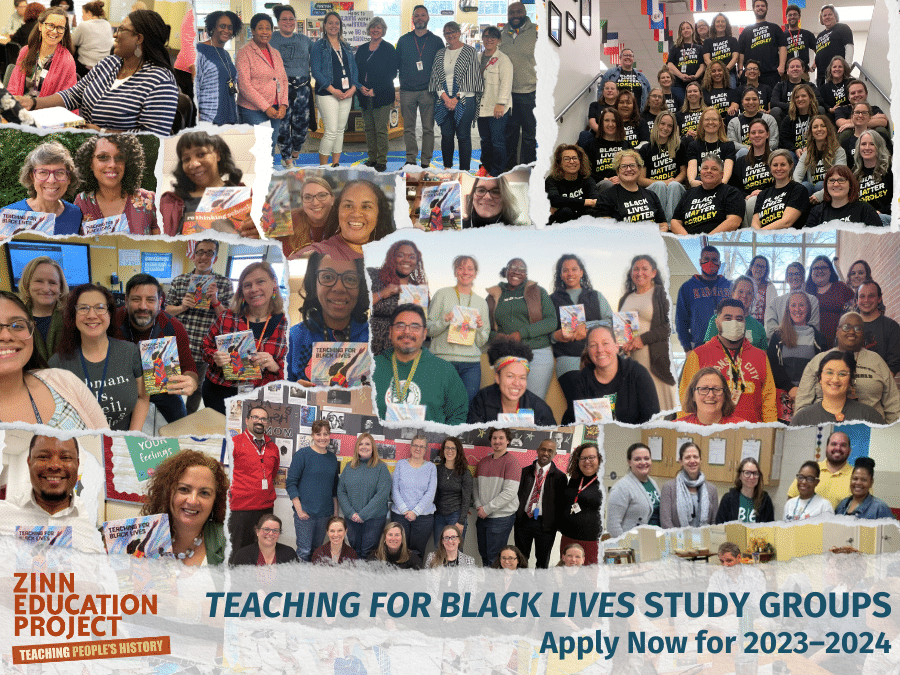It is hard to overstate the burdens public school educators have been asked to carry over the last several years. There are the perennial stressors: inadequate funding; crumbling infrastructure; standardized testing; too little time to plan, grade, and collaborate with colleagues. Then came the COVID 19 pandemic: building closures, remote teaching, re-openings and severe staff shortages; and the George Floyd uprisings of summer 2020: the calls for justice by educators and students, the promises by school leaders to take institutional racism seriously, and the waning commitment to those promises.
Next came the Monday morning quarterbacking of pandemic closures. Wielding the cudgel of “learning loss,” elites laid the blame for the traumatic impacts of a pandemic — one that has killed almost 7 million people since 2020 — at the feet of teachers and public schools.
And through all that, there has been the steady and sinister growth of book bans, curricular gag rules, and the criminalization of trans-affirming policies, all of which seek to muzzle educators from telling the truth and extending care to students.

But there is another story we can tell of the last several years — the story of more than a thousand educators from across the country, voluntarily coming together to read, learn, reflect, and struggle for more just classrooms and schools. Consider the 15 teachers at Cordley Elementary in Lawrence, Kansas, who meet monthly to discuss the Rethinking Schools book, Teaching for Black Lives, and identify opportunities to “disrupt racial inequity” in their school. Like the 18 new and aspiring educators in Minneapolis, or the 23 educators from Kirkwood R-VII School District (K–12) in Missouri, or the 14 pre-k-8th-grade Escuela Del Sol Montessori educators in Albuquerque — all are among the hundreds of Teaching for Black Lives study groups that have formed since 2020.

Oakland Teaching for Black Lives study group
No doubt, this moment calls for copious and varied forms of organizing — in our unions, at our local school and library boards, in collaboration with community and parent groups. But as we fight the wave of attacks on education, it is critical that we ground ourselves in what we are fighting for, not just against. Small, educator-led communities of study and reflection can provide that grounding. Study group members have told us that their groups have been a vital source of strength, support, and guidance during an impossibly difficult time. “It was one of the few things I took on this year that added to my resilience, to my sense of community, to my energy to keep going and do the work,” said one study group member.
WHY STUDY GROUPS?
Community is the antidote to isolation

Newark Teaching for Black Lives study group
At most schools, isolation is the norm. Teachers scarcely have time to use the bathroom between classes, answer emails and plan lessons during their prep periods, and eat a nourishing meal during their “lunch” break. We have yet to see a place on a school’s daily bell schedule labeled, “time to build meaningful relationships with other adults in the school.” Study groups provide educators a reliable structure of support and community.
I’m not sure I would be teaching after this year if it weren’t for the solidarity of this community. — Mary Beth Braker, teacher, Durham, North Carolina
This experience has been transformative for me. As a librarian you are typically a singleton in your school and feel isolated in your experiences. The opportunity to conduct a study group with other librarians has given me hope through our collective resistance. — Chris Tuttell, librarian, Raleigh, North Carolina
I think what was most deepened with my study group was the ability to find that there are other educators doing the same work with the same hopes, and that we can enact that curriculum in the classroom in our individual spaces, but do that collectively. It was also a space to share ideas and support where we may not find that in some of the teaching spaces/environments we are currently in. — Quynh Vu, teacher, Minneapolis, Minnesota
The group context gave us courage to stand, in spite of the climate. — Heather Bower, professor, Raleigh, North Carolina
My thinking is more hopeful as a result of participating in the group. I feel as though my network of support has grown exponentially. — Kai Strange, director of Teacher Workforce Initiatives, Rochester, New York

Hayward Teaching for Black Lives study group (Candace Cofield in upper right block)
My members often mentioned how holding space in this study group was therapeutic for them and inspired them to stretch themselves and collaborate differently and more positively in their school communities. — Dr. Candace Cofield, district equity administrator, Hayward, California
Having a reliable and deeply thoughtful group of allies in my community was so powerful and supportive during this difficult year. I drew strength every day at school knowing that my study group colleagues were there and would be supportive of my practices. — Kate Milano, teacher, Salem, Massachusetts
Space to be a learner

Nashville Teaching for Black Lives study group
A mainstay of school mission statements is that the educational program should create “life-long learners.” Yet, this value is rarely prioritized by school leaders when it comes to educators. Study groups encourage educators to claim time to learn — through book study and discussion, online classes, and participatory workshops. We cannot apply principles of equity and justice that we ourselves have not learned.
The T4BL groups are a place to LAND in your experience as an ally, as a good trouble-maker, as an anti-racist educator, as a colleague, as someone whose humanity is often overlooked outside of these spaces. It is a place to grow, laugh, cry, wonder, and above all LEARN without fear of getting it wrong. — Catherine Anderson, English teacher, Providence, Rhode Island
This study helped propel me forward to seek out other learning opportunities. I have done more work on this topic in the last eight months than I have in the last eight years! — Colleen Miller, teacher, Seattle, Washington.
This group gave me the opportunity to learn about teaching and empowering Black students. Our group discussions served as a jumping off point for us as a staff to dig deep, reflect on our teaching, and support each other. This study group provided a safe space to confront the injustice in our school and allowed our staff to have open discussion about some tough issues. — Sharon Heyer, teacher, Rochester, Minnesota
Our study group was a safe space for me. Since I knew all the participants as colleagues, I knew I could be honest with my reflections about what I was reading, what was happening in our education community, and what I needed to work on. They were supportive and also pushed me to be a better teacher educator. — Jennifer Olson, teacher education professor, Raleigh, North Carolina
I learned a lot as a person with holes in my education and I was able to have great conversations with other educators about how to apply what we learned in our classrooms in a tangible way that goes beyond the surface. It was a safe space to be challenged. — Elizabeth Verdeck, teacher, Sammamish, Washington
I [now] understand the importance of teaching Black history and Black culture to my students, and how to do this successfully. I understand in more depth how being a white teacher can impact the relationships built between myself and my students of color. I also learned about the importance of identity building and ensuring I incorporate texts and visuals that allow students of color the opportunity to relate and connect with. — Shaylee Picow, teacher, Rochester, New York
This study group gave me the opportunity to hear from so many voices that I normally would not have been able to hear from. My eyes were opened up in such important ways. — anonymous, teacher, Rochester, New York
Transformation through accountability
Becoming better educators, more conscientious colleagues, and building just schools requires commitment and community. Study groups provide a structure for co-learners dedicated to encouraging, pushing, challenging, questioning, and hearing one another; to make a pledge of curiosity, experimentation, and risk-taking; to promise to show up for each other and each other’s growth as social justice educators.
We would commit to trying new lessons, facilitating restorative circles, facilitating difficult discussions with colleagues or with our students and then come back and report to the group. It was motivating knowing that the group would be there to process the results together when we met. — Catherine Anderson, English teacher, Providence, Rhode Island
We read together, discussed difficult topics, problem solved, shared insecurities, challenges, struggles, and hope. We held each other accountable and held each other up. — Virginia Henry, teacher, Nashville, Tennessee
Joining the T4BL study group was the perfect way for me to extend on the anti-bias, anti-racist work I had been doing in the previous year. I got to work with a group of like-minded individuals to “do something.” So often in this work, it’s easy to get stuck in the learning and reading phase without actually turning that new knowledge into action. This group held me accountable to actually doing something that would make a noticeable change, and it allowed me to bounce my ideas off of other brilliant thinkers. — Susan Sturm, teacher, Rochester, New York
This group really helped me to contextualize the stories and themes from the book in my own classroom. I also was able to workshop and tell stories from my classroom and think through them with a group of folks who had an anti-racist lens. I felt like I could be honest about the struggles and challenges while thinking through what approach made the most sense. This group helped me to think deeply about my own pedagogy and the ways that I can push myself to be more committed to consistently integrating social justice themes into my lessons. — Lindsay Paiva, 2nd-grade ESL teacher, Providence, Rhode Island
I feel that I was challenged to push my study to examine this much more deeply, to not shy away from issues saying they were not age appropriate. It is never too early, with appropriate examples to harness the genuine sense of fairness that most children have. To see clearly, if I would not want that, then no one should be forced to accept any less. — Nena Torrez, teacher, Joshua Tree, California
This group has allowed me to test lessons, brainstorm new ideas and just be with people who are facing some of the same things I am. I am regularly challenged by peers’ lessons that we are workshopping to dig deeper into my own lessons and continue to reflect on ways to strengthen them. — Karen Lee, social studies teacher, Washington, D.C.
A springboard to action
How does one act — or teach — for justice? Answering this question from the position of an individual educator can feel impossible and overwhelming. Study groups provide educators spaces to design, organize, and experiment with putting learning into practice in collaboration with others. The study group can be an important incubator of transformative practices.
I have a new lens to look not only at my interactions with students and colleagues and community but at our larger school system and district ALL THE TIME. I feel empowered with all of the resources we have to find another approach or way into whatever we are doing in class. Now my students know that if I am wearing my BLM shirt or Black History Matters shirt at school it is not a performative act — it means that they can hold me accountable to what I have done in and out of class to show that I am living up to that belief. — Catherine Anderson, English teacher, Providence, Rhode Island

Christina Bustos (at left) and fellow T4BL study group educators rally for right to teach truth.
We worked on Student Dress code, hiring practices, getting promises from the district to hire more BIPOC educators as well as teach truth events and BLM at school week. It is becoming more commonplace to discuss these topics and the administration knows that I will be challenging them and so will our groups. We owe at least part of that success to the study groups. — Christina Bustos, teacher, Mesa, Arizona

Lindsay Paiva, Rhode Island
The study group connected with the TeachTruth RI coalition to help plan a protest outside of an anti-CRT event that was spreading false information and the 6/11 action. We have also been able to share the resources that we’ve gained (e.g., the Rosa Parks books) with colleagues and started to build curriculum together around some of those resources. — Lindsay Paiva, 2nd-grade ESL teacher, Providence, Rhode Island
We tried to address the name change of Jefferson, we organized a voting rights march, and are currently working with churches and Washington State University to come up with a meaningful Juneteenth celebration. — Anthony Haynes, teacher, Pullman, Washington
I think I’m most proud of how we took our discussions directly into action. A lot of us used the lesson plans we talked about and created, some of us talked with administration, some of us talked with different community groups and things like this. I think it’s important to take action on the items we discuss every couple weeks! — Nathan Perez, history teacher, Minneapolis, Minnesota
We helped bring to light some of the inappropriate ways our student body was acting at sporting events. This led to our athletics department taking a stand publicly denouncing behavior. — anonymous, teacher in Marion, Iowa
We were inspired to fight hard against a conservative take-over of our school board that wanted to add curricular gag rules. We built powerful coalitions. — Lesley Mace, teacher, Durham, North Carolina
We met with our assistant superintendent to demand more action from our equity committee. — Amanda Kloser, teacher in Marion, Iowa
In addition to presenting various lessons based on ideas in the book, we held a “Neighbors in Dialogue” session with members of the Latinx community to learn about their experiences and challenges living in this community. (We had previously held a similar event with the Black community.) We held several public rallies and marches to bring awareness to societal ills. We raised funds to have a Black Lives Matter mural painted on a building in the downtown area. Now we are planning our first (to be annual) Juneteenth community celebration. — Ginny Hauser, community volunteer, Pullman, Washington
Conclusion

Passaic, New Jersey Teaching for Black Lives study group
Librarian and study group coordinator Jill Groff told us:
I would share that when the apathy seemed pervasive and morale was low, being in this group lit a fire of hope to keep me going and remember my why. I so appreciate the fellowship and support of people who genuinely love kids, all kids, and go above and beyond every day to fight for them, to make lessons to inform and empower, and just to be in a space with so many wonderful educators with shared values and goals.
And that is exactly what Teaching for Black Lives Study Groups can provide: a fire of hope. Not a saccharine hope that delivers neither substance nor sustenance. But hope rooted in a set of shared commitments — to learn together, analyze together, organize together, and act together — for more justice in our classrooms and schools.















Twitter
Google plus
LinkedIn